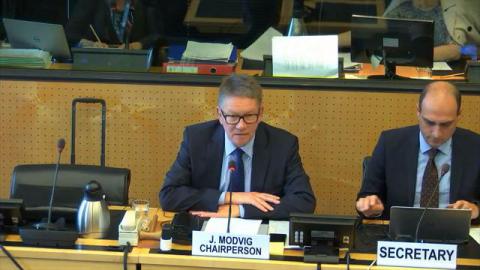
On 20 March 2017, Alkarama submitted its shadow report to the Committee against Torture (CAT) ahead of Bahrain’s second periodic review aimed at examining Bahrain’s implementation of the Convention Against Torture (UNCAT). Bahrain’s State report will be examined during the Committee’s 60th session, on 21 and 24 April 2017*.
In its shadow report, Alkarama expressed its concern over the common use of torture in Bahrain and the growing number of allegations that have emerged recently. The most frequent forms of torture and mistreatments described by victims include electrocution, beatings, suspension in painful positions, forced standing, exposure to extreme temperatures, sleep deprivation, verbal abuse, threats of rape to the detainee or family members, and insulting the detainee’s religious beliefs. In some cases, torture that individuals were exposed to even led to their death in detention. In its report, Alkarama outlined a number of issues which create a breeding ground for the practice of torture in the country.
Violations of legal safeguards afforded to detainees
Although Bahraini laws afford detainees a number of legal safeguards which should ensure fair trials, it emerges from the cases documented by Alkarama that the law is rarely applied in practice. Indeed, suspects are usually arrested without being informed of the reasons or without being presented with a warrant. Furthermore, the detainees are often held incommunicado for prolonged periods of time and are denied the right to access their lawyer and to legally challenge their detention.
The lack of respect for these safeguards places the detainee outside the protection of the law, thus creating a breeding ground for the practice of torture. It also emerges that the most common violation is that of article 15 UNCAT, which imposes on State parties to reject the admission of coerced confessions into evidence. In Bahrain, torture is used to elicit confessions from detainees, which are subsequently admitted in a court of law as evidence to secure their conviction, as was the case for instance of Ahmad Ali Mohamad, who was sentenced to 25 years in prison on the sole basis of statements he made under torture.
Alkarama therefore recommended a strict implementation of these safeguards and an unequivocal respect of the exclusionary rule provided for by article 15 UNCAT.
Lack of independent and efficient complaint mechanisms
After the 2011 uprising during which time five individuals died under torture, the Bahraini government established three bodies in charge of receiving and investigating allegations of torture and ill-treatment: the Ministry of Interior’s Ombudsman, the National Security Agency’s Ombudsman and the Special Investigation Unit. However, these bodies lack independence due to their tight links to the institutions they are supposed to monitor and investigate. They furthermore lack financial independence and are composed of members nominated by the head of the institutions whose members they receive complaints against. This lack of independence coupled with a refusal of these bodies to register and investigate complaints puts their efficiency into doubt. Another problematic aspect is their lack of transparency which erodes public confidence in these mechanisms.
Alkarama thus recommended the revision of the establishing acts of these institutions in order to ensure their independence and efficiency and called for greater transparency.
Failure to adequately prosecute acts of torture
Besides the lack of transparent data to verify the outcome of investigations into torture allegations, information provided by the Bahraini authorities in their State report points to an alarming trend whereby sentences passed by domestic courts against perpetrators of torture do not reflect the gravity of their crimes. Indeed, the State report claims that in cases of torture in which a conviction was secured, sentences were handed out ranging from one month to seven years. In one case reported by Bahrain in its report to the CAT, the officer found guilty of beating a man to death was sentenced to six months in prison despite the fact that the Penal Code imposes life imprisonment for cases in which torture results in death.
In contrast, and in early 2017, three individuals were executed for having allegedly killed a police officer; they were convicted after a flawed trial in which confessions made under torture were admitted as evidence. The “discrepancy between the judgments awarded against the accused persons in security cases […] in which terms of imprisonment are usually long, and the judgments awarded against the accused persons in cases of torture and other forms of ill-treatment by the employees of the Ministry of Interior”, has been decried by Bahrain’s National Institute for Human Rights (NIHR).
Alkarama hence recommended in its shadow report that Bahrain ensure that the crimes of torture, ill-treatment and death under torture carry appropriate penalties that reflect their grave nature.
Alkarama hopes that the concerns raised in its shadow report will be addressed constructively during the dialogue between the Committee against Torture and the representatives of the State party, which will be held on 21 and 24 April and can be watched live on the Treaty Body webcast .
*During the review, you can follow @AlkaramaHR for live tweets.
For more information or an interview, please contact media@alkarama.org (Dir: +41 22 734 1008).
